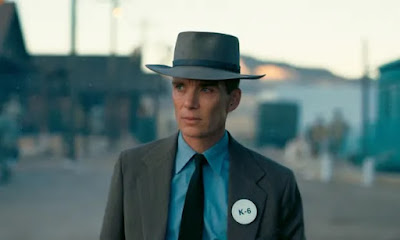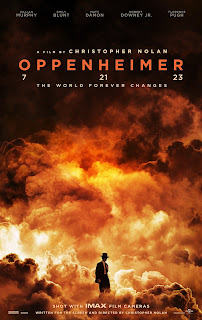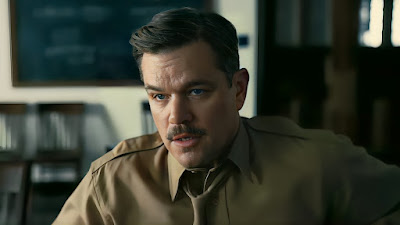I tend to sort Christopher Nolan’s films into two categories: those that are about filmmaking, and those that try to be about something else.
In the second category: The Batman trilogy is great if you don’t look too closely at its politics. Insomnia... I barely remember it. Tenet doesn’t reach its goals. Dunkirk was deeply affecting, as all war movies are, but suffered from the conceit of three different “timelines.”
It’s the films in the first category that I like best. Memento’s two color palettes and loop-de-loop narrative highlighted the power of visual storytelling in a way that was new to me when it came out. The Prestige links visual trickery and plot together through Michael Caine’s diegetic narration. It also has David Bowie! Inception, as Nolan himself has explained, uses the process of filmmaking as a guiding principle, with Ariadne as the set designer, Cobb as the director, Eames as the actor, and so on.
Oppenheimer allows Nolan to merge the two categories, making a movie about movies that is also, finally, about something substantive beyond the metafictional. It is Nolan’s best film yet, although I don’t think it has the rewatch potential of Memento (what actually happened?) or Inception, which is so glossy that it’s lovely background noise after you’ve seen it a billion times. This movie is just too heavy for that.
Oppenheimer, of course, is not actually about movies. But it is about directing, with Cillian Murphy in the titular role playing the same basic function as Leonardo DiCaprio in Inception or Michael Caine in The Prestige: the person putting all the pieces together, bringing the team together, building something, failing, trying again, and then, finally, considering the fallout.
Of course, more obviously, it’s a biopic of the director (ahem!) of the Manhattan Project, which ushered in the nuclear age and caused the death of about a quarter of a million people. It is about a brilliant man who never really thinks through the consequences of his actions until it’s a bit too late, and frequently seems to forget that other people might have wants, needs, or even interior lives.
One of my favorite moments in the film is when Oppie brings his wife and child to their new little house at Los Alamos, and she points out that he didn’t include a kitchen. Another recurring pattern is how easily Oppie manages to make a terrible first impression by accidentally insulting someone he just met—which winds up setting up his conflict with Admiral Strauss (played by Robert Downey, Jr, who is phenomenal) and his own struggles during McCarthyism.
That’s not to say that Nolan portrays Oppie as unsympathetic, or that Cillian Murphy fails to generate audience empathy. They both excel. Watching this movie was like receiving a gift of understanding someone else, their strengths and weaknesses and contradictions and quirks. This film doesn’t praise Oppie, but it doesn’t bury him, either. It interrogates our ideas about scientists (and scientism), and about the Great Man method of history... by showing us a Great Man who is actually just a really complex guy.
 |
| Nolan also frames Oppie as a sheriff in a Western. Just swap the fedora for a Stetson. |
Oppenheimer is a Nolan film, so it doesn’t follow a purely chronological sequence. There are flashbacks (as far back as Oppie’s college years) and flashforwards (to Oppie’s struggles during the Red Scare and McCarthyism). The center of the film—its narrative climax and its beating heart—is the invention of the bomb, including an amazing test sequence, where the camera tracks various groups of people reacting to the explosion.
As Oppie himself watches the bomb explode out in the desert, we hear a voiceover of his famous quote from the Bhagavad Gita. In real life, he didn’t say that until years later. But in this film, he utters it the first time long before Los Alamos, while having sex with his mistress Jean Tatlock (played perfectly by Florence Pugh). To hear it again, as the bomb goes off, creates a link between concepts and moments: sex and death, penises and bombs, love and destruction, thrill and consequences (especially given how Tatlock’s story ends, and how Oppie treats her). There’s a complexity there — even, dare I say, some welcome messiness – that I have never associated with Nolan before, and which brings me great joy.
The film is a technical marvel. The sound design is amazing. At least, I think it’s amazing. This is only the third film I’ve seen in the theaters since COVID, and one of those was a documentary (the other was the new Mission: Impossible). My seat shook; I loved it. We hear sounds, especially stomping, hours before we realize what they signify. It was wonderful. I could even understand about 90% of the dialogue, which is a big step for Nolan!
I really can’t say enough good things about the cast, either. In fact, I don’t have room in this review to do so, so I’ll just say: they are all great (shout-out to my mom’s favorite cutie pie Matt Damon!), and I’d love to hear which was your favorite in the comments.
The film is also beautiful to look at. I loved the repeated motif of ripples in puddles and in ponds, which ties into the conversation between Oppie and Einstein that unspools over the course of the narrative, and which ties into the movie’s final moments, which I’ll gently allude to in what follows.
I’m used to overthinking my favorite Nolan films, because I love a narrative puzzle. But Oppenheimer doesn’t just encourage metafictional, postmodern, drawing diagrams with straws types of thought. It also raises serious questions that matter not just for how we understand history but how we may fear it will be repeated.
At one point in the film, someone asks Oppenheimer what to do with Los Alamos now that the tests have been completed, the bombs detonated, and the war won. “Give it back to the Indians,” he says. It’s a throwaway line, of sorts, but one that made me think of Leslie Marmon Silko’s 1977 novel Ceremony, about a young Pueblo-Apache man named Tayo returning home from the Pacific theatre of WWII with what today is known as PTSD.
That book takes place primarily in the American Southwest, especially eastern Arizona and New Mexico. The book’s climax, in a disused uranium mine not far from Los Alamos, which Silko references directly, forces Tayo to consider the sheer horror of what was invented at Los Alamos, on Indigenous land, and the sheer impossibility of fixing the world in the face of colonialism, acquisitiveness, and other forms of what Silko, drawing on Pueblo and Navajo philosophy, calls “witchcraft” (which is distinct from western concepts of witchcraft).
The first time you read that book – that is, the first time I did — the sudden intrusion of fear about nuclear war is unexpected. But that’s because I’m an elder millennial, just a kid when the Berlin Wall fell, in middle school during the perestroika years. Unlike those who were children in, say, the 1960s, we’re not trained to be afraid of nukes. We are, in fact, taught that fear of nuclear war was part of the Cold War panic. Not something to really be afraid of. As Nolan put it in an interview with the New York Times, “When I first told one of my teenage sons what I was writing, he literally said to me, that’s just not something anybody worries about anymore.”
Nolan interlaces the encounter between post-war Oppenheimer and an aging Albert Einstein throughout the film. The final moments, in which Einstein and Oppie consider the consequences of the bomb, make this movie more than a biopic. It is a cautionary tale about the consequences that we have forgotten to consider, much as Oppie himself frequently forgot to consider consequences in matters both world-changing and personal.
The chilling imaginative sequence that brings the film to a close asks us to consider a question also addressed in Barbie: Do you guys ever think about dying?
Four out of four Matt Damons.
Josie Kafka is a full-time cat servant and part-time rogue demon hunter. (What's a rogue demon?)



Hi everyone! Please feel free to put spoilers in the comments here.
ReplyDeleteAlso, I'm not kidding about what I wrote above: I'd love to hear about everyone's favorite actor or character in the movie.
Wow, what a great review. Now I’m looking forward to watching a great movie.
ReplyDeleteI do sometimes wonder whether Oppenheimer gets more blame (or credit, depending on your point of view) than he actually deserves, simply because he's such a remarkable figure, both physically and personally. The Bomb was an inevitability; physics had been heading in that direction since the discovery of the electron and the neutron, and one would have been built sooner or later. Oppenheimer was a very strange, very intelligent, and very charismatic person who happened to be in the right place at the right time.
ReplyDeleteThe fellow who really started it all off was Leo Szilard, who suddenly realised, whilst stepping off a kerb on a drizzly London morning, that a nuclear chain reaction could be achieved by bombarding an unstable element with neutrons, causing atoms to split and release energy and more neutrons, splitting more atoms, etc. Szilard was the one who got Einstein to write the letter to Roosevelt. Szilard and Fermi got the Pile working under the stadium in Chicago. And Szilard was disliked by the Army because he asked hard questions and wanted to ensure that the Bomb was not initially used on civilian targets or to start an arms race with the USSR; obviously, he was ignored in both cases.
Anyway, a film about Szilard would be really interesting, but he wasn't as photogenic as Oppenheimer, so it probably would never fly.
Oppenheimer wore a pork-pie hat, by the way, not a fedora.
I've yet to see Matt Damon act. I've seen him in movies, of course. Or what appeared to be him. It may have been a doll shaped like him and propped up against a door frame. A puppeteer may have been working the jaw. I think he's about as useful as a cardboard cutout, is what I'm saying. I just don't get him.
ReplyDelete'The Prestige' is a great film, sadly underrated. I can't think of a better one. And it's still Scarjo's best performance (because the script gave her something to do other than walk around).
I'm still debating if I want to see this. It looks serious, and I don't do well with serious movies. But sometimes they surprise me.
"I could even understand about 90% of the dialogue, which is a big step for Nolan."
ReplyDeleteSold!
Good review. Look forward to seeing this, and the other "think about dying" movie everyone's raving about.
Nomad, according to The Guardian, were both right: it's commonly mistaken for a fedora and s porkpie, but is neither, they say:
ReplyDeletehttps://www.theguardian.com/film/2023/jul/21/cillian-murphy-oppenheimer-hat-sparks-demand-for-fedoras
ReplyDeleteThat anonymous post was me. Darn Blogger.
Well, there you go. The bloke was all about being different.
DeleteInteresting article; always fun to read about making some unique thing like that, and having it turn out just right. Cheers.
This was the first movie that I've seen in theaters since Covid, and what a great one to go back with. I loved it. The cast, the Trinity test in all of its glory, the fragmented nature of sound cues that we only understand later on in the film... it was all so good.
ReplyDeleteReally can't say enough of about this cast. I don't know if I can pick a favorite. RDJ (who I still only saw as RDJ as opposed his character) was absolutely phenomenal. The absolute vitriol and pettiness that radiated off of him towards the end of the film was palpable. I would safely argue that this was his best performance.
Emily Blunt may have had my favorite moment during her interrogation when she switched from meek and overwhelmed to stone cold and powerful. I only wish that scene was longer. (And that she had more to do in general.)
Florence Pugh was absolutely electric and I couldn't take my eyes off her whenever she was on screen. (And not just because she's not wearing any clothes in like 98% of her screen time, honestly can she not wear clothes?) That brief flash of black gloves holding her under the water was absolutely terrifying. Apparently, there's a conspiracy theory that she was murdered by the government, which that was a reference to. I also wish she had more to do in general.
And of course, the movie wouldn't work without Cillian Murphy. He carries the entire thing and does so fabulously. Like you said, it doesn't praise or bury Oppie, but instead lets him live in his complications and messiness and mistakes.
Adam, it is definitely a serious movie, but I don't know if it's a Serious Movie, if that makes sense. Obviously, it's a biopic about a heavy topic, but I wouldn't put it in the same category as your traditional Oscar bait movies that are all about 'How Serious and Deep We Are.' It doesn't have the same air of self-importance.
That's good to know. My eyes roll so far back they pop out and roll away every time a film or TV show wants me to know that the writers are, like, so totally deep.
DeleteFangirl, hi!
ReplyDeleteI loved Emily Blunt's last-minute awesomeness. I tried to think of it as Nolan reminding us that Oppie had this awesome wife the whole time.
The scene with Jean and the bathtub was fascinating, wasn't it?
Hi, Josie! :)
DeleteAll Oppie had to do was listen to his wife. She was always right.
And the bathtub scene really was. Especially how it was essentially split in two: the first glimpse when Oppie learned the news and then later when he told Emily Blunt what had happened. Really, the fragmentation of all the scenes was fascinating. But it also made me want more. That flash of gloves made me sit up and go 'wait, what?' but then that was it. There was nothing at all beyond that. It was frustrating, even if I understand that that wasn't the movie and story being told.
Fangirl, have you seen Memento? There's similar ambiguity in some scenes in that movie, also involving a woman in peril in a bathroom.
ReplyDeleteSaw it yesterday. That's another masterful slice of cinema from Nolan. I agree with what you said about the cautionary tale aspect. Between this and Terminator 2 as a kid, I feel I've always had a healthy fear of WMDs. This is probably Nolan's most meaningful film, alongside Interstellar.
ReplyDeleteThis is probably one of the best lineups of actors I've seen in one of his movies, not just who was cast but how well they were cast; it's refreshing to see Cillian Murphy and RDJ in roles like this, after years of everyone knowing them only as Thomas Shelby and Tony Stark. The one who really won me over was Josh Hartnett; it's been a long time since I've seen him in a big movie like this, and he was fantastic. There's another actor who appears briefly and completely owns the screen when he's on, but I don't want to give it away because it was a surprise for me.
I can still remember the trailers and anticipation leading up to the release. It was truly an experience. The final scene of Oppenheimer envisioning the possible future with the music and editing is cinema excellence!
ReplyDelete